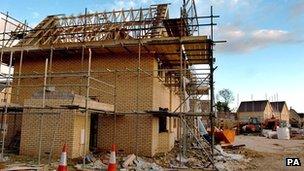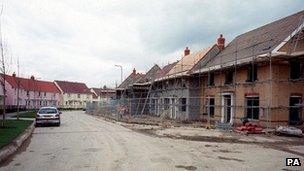Ex-minister Peter Luff attacks Cameron's housing plans
- Published
- comments

Ex-minister Peter Luff has attacked David Cameron's housing plans
Mid Worcestershire's Conservative MP Peter Luff certainly seems to be enjoying what we Westminster watchers call 'the freedom of the back benches'.
No sooner is he relieved of his responsibilities as a Defence Minister in this month's reshuffle than it emerges he has decided to stand down from Parliament at the next election.
But the signs are he may be in no mood to think about going quietly during the remaining two and a half years.
He is one of a number of newly-departed ministers signalling their willingness to criticise the policies of the government in which they so recently served.
Prime Minister, be warned.
'Ex-factor'
It's what happens to governments in the mid-term.
On to the back benches come former ministers mixing and mingling with other MPs who now see their own chances of promotion passing them by.
In Peter Luff's sights are the Prime Minister's plans to put £10 billion into a drive for new housing as part of the government's stimulus package.

Former Defence Minister Peter Luff has branded government housing plans 'unsustainable'
David Cameron also aims to simplify what he sees as over-restrictive planning regulations which he believes have been putting the brakes on economic development.
Even before Mr Luff's intervention, the government had been fending off accusations that its controversial National Planning Policy Framework, external was tantamount to what critics called "a developers' charter".
By this they meant a free-for-all for housing projects which would threaten our precious Green Belt areas.
Now he is opening up a new front in the debate, arguing that a splurge of construction would not really do much for the economy either: "If building houses were the answer to a maiden's prayer when it comes to growth, then Spain and Ireland would be booming, not bust."
Housing shortage
The argument is expected to intensify next week when the annual conference opens in Birmingham of the National Housing Federation, external, the umbrella organisation representing a wide variety of social landlords including housing associations.
It warns of a chronic shortage in the supply of housing with waiting lists lengthening, and house prices and rents soaring despite the recession.
According to the federation, only 8,600 homes were completed in the West Midlands during 2011/12 compared with over 15,000 in 2006/7.

The National Housing Federation warned of a chronic shortage of new homes
But Mr Luff says the real issue is a shortage of demand for housing.
Whatever the truth of the matter, the politics are fascinating.
On the face of it, if a government wanted to stir up dissension on its back benches and rebellion in the shires, it couldn't do much better than to propose a wave of building which opponents believe breaches the fundamental principles of the planning system.
Or is this just another case of 'not in my back yard'?
One campaigner for a relaxation of the planning regime put it graphically: "We have gone beyond the age of the NIMBY," he told me.
"Now it's the age of the BANANA: build absolutely nothing anywhere near anything!"